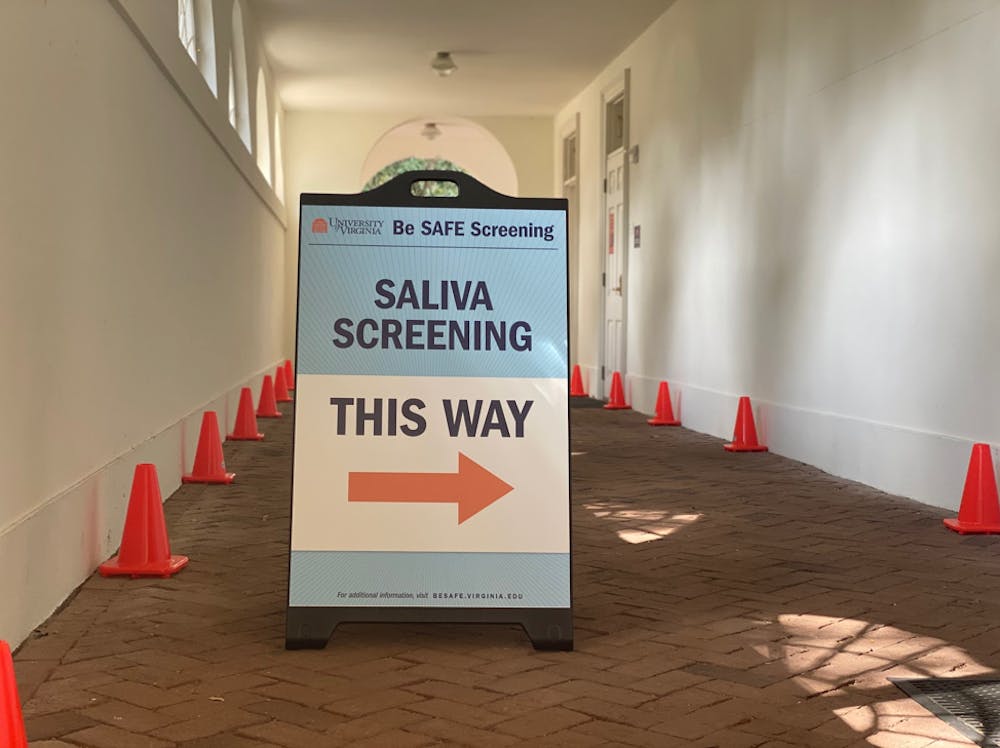We are all excited to move forward to a time without extreme COVID-19 precautions. However, we must be careful to balance our eagerness with caution. This year the University lessened many of its previous restrictions, including mandatory prevalence testing. This decision, in particular, is unsafe. For our safety, the University should reinstitute mandatory COVID-19 testing for all students, faculty members and staff.
The current COVID-19 testing policy requires unvaccinated members of the University community undergo weekly prevalence testing. Vaccinated students are not required to follow weekly prevalence testing but still may get tested through the University if they wish. Many in the University community have criticized this policy. Students have expressed concerns about appointment availability, long lines at testing centers and confusion about whether testing is available for asymptomatic students. Additionally, Young Democratic Socialists of America at U.Va. demanded mandatory prevalence testing for all students every two weeks. Professors too questioned the effectiveness of removing mandatory testing.
University administration explained that the current policy aims to focus on at-risk populations — unvaccinated people and those with symptoms or who have been in close contact with an infected person. Despite these populations being the most at risk, the University should still be testing a larger group of the student population.
For one, there are concerns about the spread of new variants. In August, the Centers for Disease Control and Prevention reported an “alarming rise in the COVID-19 case and hospitalization rates around the country.” They attributed this shift to the Delta variant of COVID-19, which is more infectious than other strains and can be contracted and transmitted by fully vaccinated people. Thus, despite the vast majority of people on Grounds being fully vaccinated, there are still some valid lingering concerns. These apprehensions are even more important to note when one considers the active cases on Grounds — the University currently reports 72 active COVID-19 cases and 886 cases this semester.
The current testing system puts an unfair burden on students, asking them to choose between their health and their academic standing. Symptomatic students are expected to stay home until they can be tested, then quarantine if they test positive. However, this semester is simply not organized to care for students who have to quarantine. The University has embraced an in-person semester over a hybrid one, and attendance is still listed on the syllabus of many classes. The University should not be putting students in a situation where they’re forced to prioritize either their academic standing or their physical health — especially since sick students can put others at risk.
Furthermore, particularly with the rise of COVID-19 variants around the world, the lack of routine prevalence testing prevents the University from having a full picture of the true situation on Grounds. Compared to the complete student body, the unvaccinated student and faculty population is too small to provide an accurate representation of COVID-19 cases within the community as a whole. Despite the University encouraging symptomatic students to get tested, it is very unlikely that this is occurring — when looking at the University’s COVID tracker, we can see the relatively small number of tests given each day. Even professors expressed concern that students, without being tested, are self-diagnosing themselves as not having COVID-19. One professor noted that although they remind students to not come to class if they are symptomatic, they still hear students “coughing and sniffling during class.” The University’s current policy prevents us from having the full picture of COVID-19 cases on Grounds.
The University has a responsibility to know the status of COVID-19 cases on Grounds. Students, faculty and the Charlottesville community must all be kept updated so that they can make the most informed decisions possible. The University’s failure to maintain complete data on COVID-19 cases on Grounds puts all of these groups at risk. In particular, keeping the number of COVID-19 cases low and remaining up-to-date on the latest COVID-19 data is critical for the safety of immunocompromised students, who have an increased vulnerability to infection and thus must take additional precautions. In addition, vaccinated immunocompromised people are still at risk of contracting COVID-19 due to concerns of vaccine efficacy in this population.
The pandemic has changed the way we see the world. Though many are eager to move on, we cannot ignore the realities of breakthrough cases and the threat COVID-19 still poses to our community. The University must reinstitute prevalence testing for all students. Moreover, the pandemic has shown us the importance of flexibility and of valuing our health. The University should embrace new hybrid ways of teaching to encourage students to prioritize their own health, whether they’re sick due to COVID-19 or not. We must all learn from the last year and recognize the importance of our health and keeping the community safe.
Jessica Moore is the Senior Associate Opinion Editor for The Cavalier Daily. She can be reached at opinion@cavalierdaily.com.
The opinions expressed in this column are not necessarily those of The Cavalier Daily. Columns represent the views of the authors alone.







